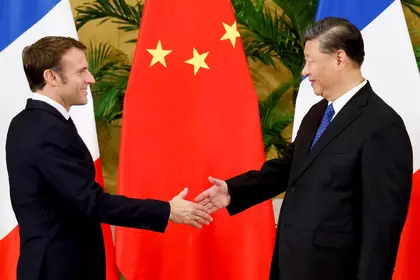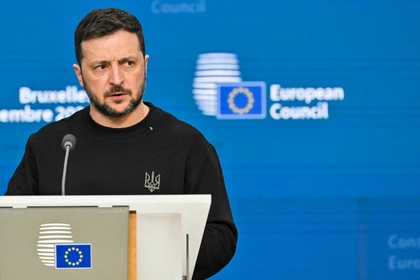The EU is seeking a reset in its ties with China, though Beijing's refusal to condemn Moscow's war in Ukraine clouds prospects for any grand rapprochement.
A flurry of European leaders has descended on Beijing in a push to get dialogue going, with key visits by French President Emmanuel Macron and EU chief Ursula von der Leyen scheduled this week.
JOIN US ON TELEGRAM
Follow our coverage of the war on the @Kyivpost_official.
They follow German Chancellor Olaf Scholz, European Council President Charles Michel and Spanish Prime Minister Pedro Sanchez, all of whom have visited Beijing since China dropped its zero-Covid restrictions in December 2022.
EU Commission President von der Leyen acknowledged last week that ties have become "more distant and more difficult" in recent years.
"Understanding each other starts with speaking with one another," she said.
The goal of Michel's December visit was to revive dialogue between the European Union and China, a European ambassador said in a recent briefing to journalists.
And the long-term objective is to hold an EU-China summit in Beijing in June or July, according to diplomatic sources.
The EU's top diplomat Josep Borrell will also visit China soon, the same sources said.
"We can see there is this desire to re-establish contacts and above all to weigh in as the EU," Valerie Niquet, head of the Asia programme at France's Foundation for Strategic Research (FRS), told AFP.
The idea is to "strike up normal relations again", she added.

Orban Plans to Block EU Sanctions on Russia Ahead of Trump Inauguration
Analysts say a re-establishment of "business as usual" could also be beneficial from Beijing's perspective.
"China is interested in the EU for two reasons: in terms of economics, it's an essential market," Niquet said.
"And it could eventually be a way of circumventing American pressure at various levels, and driving a wedge into any sort of Western unity against China."
- Ukraine as 'determining factor' -
High on the agenda for the meetings in Beijing this week is the conflict in Ukraine.
Both Macron and von der Leyen appear set on reiterating the European Union's commitment to Ukraine in their discussions with China's Xi Jinping.
While China seeks to position itself as neutral in Russia's war in Ukraine, Beijing's refusal to condemn Moscow's invasion in February 2022 has sparked condemnation in the West.
"Far from being put off by the atrocious and illegal invasion of Ukraine, President Xi is maintaining his 'no limits friendship' with Putin's Russia," von der Leyen said Thursday.
"How China continues to interact with Putin's war will be a determining factor for EU-China relations going forward."
Xi's visit to Moscow in March saw the Chinese and Russian leaders hail a "new era" in ties between their two nations.
"The way China positions itself on the war in Ukraine is a disappointment for Europe," a European diplomat currently posted in Beijing told AFP.
But she was skeptical China would be persuaded by the European Union to alter its position, because Beijing still sees Europe as "the United States' little brother".
Still, she said, the fact that EU-China face-to-face meetings were resuming was a positive development.
- Trade imbalance -
The other big topic up for discussion is the trade imbalance between the two sides.
"We need to rebalance this relationship," von der Leyen said Thursday.
Joerg Wuttke, president of the EU Chamber of Commerce in China, put it more bluntly.
"Our sales are miserable," he told AFP.
"Last year, we only shipped 1.6 million containers to China, exports went down dramatically -- and China has been incredibly successful, shipping 6.4 million containers into Europe."
Wuttke also estimated that European investments in China have gone down by as much as 50 percent -- with the exception of German carmaker BMW, which has invested heavily in electric vehicle development in the country recently.
Foreign investors were spooked by the stringent zero-Covid regulations in place throughout most of the pandemic, which regularly shut down factories and disrupted supply chains.
They also battered the Chinese economy, which grew only three percent in 2022, the lowest in decades.
The European diplomat who spoke to AFP said that she believed China would use the meetings to raise the issue of the EU's stalled Comprehensive Agreement on Investment with Beijing -- held up by rows over human rights and sanctions.
"Chinese companies have a strong interest to invest in Europe, that's why China is pushing again for the ratification of the investment agreement," said Wuttke.
But according to the diplomat, "the geopolitical conditions have changed so much since the conclusion of the negotiations in 2020, so there is no chance of progress on that point".
You can also highlight the text and press Ctrl + Enter






